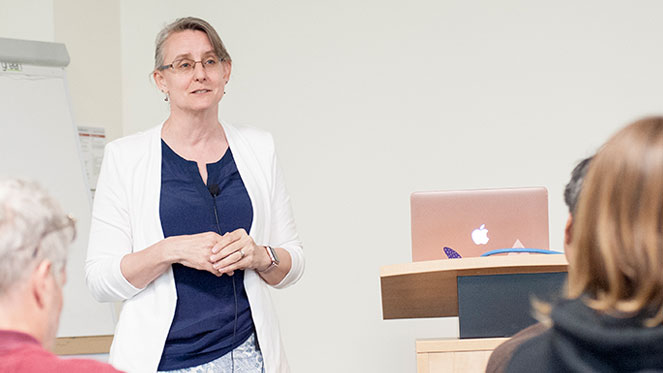
The Ethics of Time Travel
By Ann Lyon Ritchie
When it comes to time travel, physicists say it could happen.
Mara Harrell, teaching professor of philosophy in the Dietrich College of Humanities and Social Sciences, asks whether it should.
"Deciding whether we should travel back in time, if we could, is just like everyday decision making. In philosophy, we approach this kind of question as a thought experiment," Harrell said.
Harrell's Spring Carnival talk, "Traveling Through Time: Exploring the Ethical Boundaries of Future Technology," was part of CMUThink, an Alumni Association program designed to provide continued intellectual engagement for CMU's alumni community through regional events, webinars and discussions.
In an ethical thought experiment, a person thinks through the consequences of an idea or scenario to determine which sequence of events would lead to the best outcome.
"A thought experiment is useful to isolate the things we think are really important. It helps us to make ordinary decisions more clearly," Harrell said
Time travel, indeed, would be a powerful agent of change, but a scholarly approach to decision-making, ethics and social responsibility also grants the ability to make a difference in the world. An educated mind can wield the power to change the future every day.
Alumni expressed interest in time travel that ranged from valid concern for preventing tragedies to curiosity.
"Why not purely to gain information? We could observe and learn about what happened in the past," asked Janine Jelks-Seale (HNZ 2016).
Harrell countered with examples of significant ethical issues, such as gaining private information on the lives of others. Even efforts to prevent tragedies could result in causing new ones or preventing other events from occurring.
Harrell pointed to time travel's possibilities—and problems—using films such as "Back to the Future," "Harry Potter and the Prisoner of Azkaban," "Looper" and "Terminator II," as well as the literary examples of the novel "Timeline" by Michael Crichton and short stories "All You Zombies" by Robert A. Heinlein and "The Sound of Thunder" by Ray Bradbury.
When the time travellers in these examples change the course of history, an individual has decided that one timeline of events is better than another.
"We all may pick different options as better. Who is the authority to say what is right or wrong? Such a decision is at the heart of ethics as a discipline," Harrell said.
This isn't the first time Harrell has tied philosophy to science fiction. She has taught Dietrich College Freshmen Seminars on Philosophy and the Matrix and Science Fiction and Philosophy. Her seminar on "The 100," the CW’s futuristic television show, engaged first-year students in issues of morality, free will and other reflections on the human condition and went viral, thanks to media coverage and the series’ creator and executive producer Jason Rothenberg tweeting about it.
Spring Carnival and CMUThink events allow alumni to travel back to their student mindset and revive their journey in self-discovery.
Watch a video of Harrell’s talk
Learn more about upcoming CMUThink events